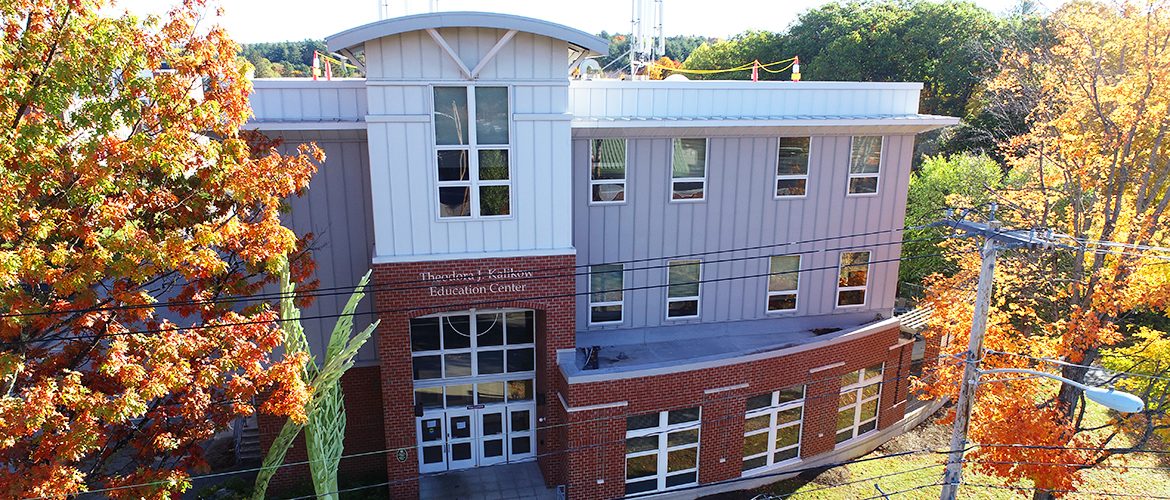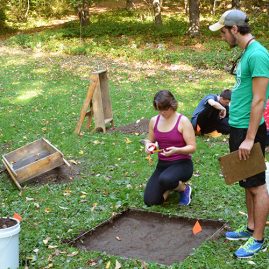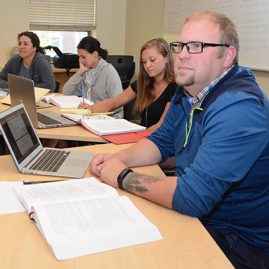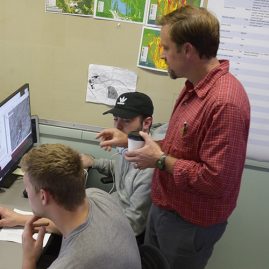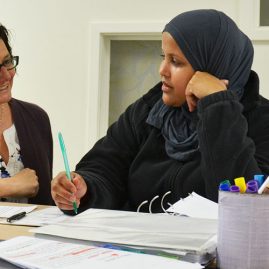Students enrolled in the University of Maine at Farmington Rehabilitation and Human Services Program can now prepare for a career as a Certified Alcohol and Drug Counselor with access to the University of Maine at Augusta’s Substance Abuse Rehabilitation Technician Certificate.
This collaborative effort between UMF’s Rehabilitation and Human Services Program and the University of Maine at Augusta’s (UMA’s) Mental Health and Human Services Program allows you to prepare for the Certified Drug and Alcohol Certification (CADC) exam more easily.
UMF students can complete up to 15 credits (5 classes) at Farmington to be used towards the required 30 Substance Abuse Rehabilitation Technician credits at UMA. The other 15 credits (5 classes) must be taken at UMA to make you eligible for the UMA Substance Abuse Rehabilitation Technician Certificate.
Upon completion of UMA’s Substance Abuse Rehabilitation Technician requirements, you’ll be eligible to apply for the UMA Substance Abuse Rehabilitation Technician Certificate. Once you receive your certificate you can then apply for the Certified Alcohol and Drug Counselor (CADC) license in Maine.
Save more than $5,500 per year in tuition. This University of Maine at Farmington program qualifies for the NEBHE Tuition Break.
Through the NEBHE Tuition Break program, students from Connecticut, Massachusetts, New Hampshire, Rhode Island, and Vermont receive a $5,670 tuition discount on all UMF degree programs.
Note: For this particular program, the NEBHE tuition break applies only to the courses you take at UMF.
Addiction Rehabilitation Professionals are in Demand
One in four families is affected by substance use disorder. According to the U.S. Centers for Disease Control, “For every drug overdose that results in death, there are many more nonfatal overdoses, each one with its own emotional and economic toll.” The Federal Substance Abuse and Mental Health Services Administration also says, “serious workforce shortages exist for health professionals and paraprofessionals across the United States.”
According to the Occupational Outlook Handbook, the job outlook for substance abuse and behavioral disorder counselors is expected to grow by 31 percent through 2023. Perhaps surprising, however, is that the need is increasing in all parts of Maine and New England, from cities and urban areas to wealthy suburbs to rural small towns. Unfortunately, the problem of addiction crosses all socioeconomic boundaries.
Below are the UMF courses accepted by UMA for the certificate as well as the ten UMA courses in the program. These courses can be taken in person.
UMA Requirements and their UMF Equivalent
UMA Requirement (online)
HUS 101 Introduction to Human Services
HUS 125 Intro to Substance Use Disorder
HUS 212 Case Management
HUS 233 Trauma: Recognition and Interventions
HUS 305 Group Process
HUS 232 Crisis Intervention
HUS 326 Counseling for Substance Use Disorder
HUS 308 Assessment and Planning
HUS 335 SUD Counseling with Diverse Populations
Plus One Elective from the Following at UMA
HUS 222 Psychosocial Rehabilitation
HUS/SSC 332 Relational Systems that Support SUD
HUS 342 SUD and Trauma
UMF Equivalent (in-person and online)
REH 120 Introduction to Social Services
REH 250 Addictive Behaviors and Recovery
REH 310 Principles of Casework
REH 420 Trauma & Resiliency
REH 305 Group Process
—
—
—
—
Plus One Elective from the following at UMF
REH 249 Psychiatric Rehabilitation
—
—
What can you do with a Substance Abuse Rehabilitation Technician Certificate?
Data comes from the U.S. Bureau of Labor Statistics and other sources. Median Salaries for positions in Maine typically fall below those of other New England states.
Additional UMF Rehabilitation & Human Services Offerings
- Rehabilitation & Human Services
- Rehabilitation Services Online Degree Completion Program
- Counseling 3+2 – B.S. in Rehabilitation Services to M.S. with USM
Contact Us
Office of Admissions
University of Maine at Farmington
246 Main Street
Farmington, Maine USA 04938-1994
tel 207-778-7050
fax 207-778-8182
TYY (via Maine Relay Service) dial 711
umfadmit@maine.edu


